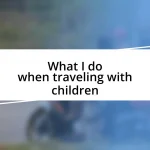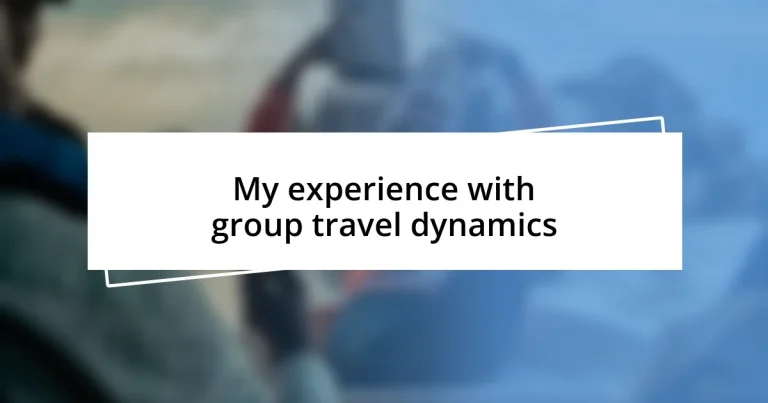Key takeaways:
- Effective communication is essential for successful group travel, helping clarify expectations and build trust among members.
- Understanding and embracing different roles within the group, such as planners and peacekeepers, enhances collaboration and strengthens bonds.
- Flexibility and openness to unexpected experiences can lead to cherished memories, highlighting the importance of shared challenges and moments.

Understanding group travel dynamics
Group travel dynamics can be fascinating yet complex. I remember my first group trip where clashing personalities led to some unexpected tensions. How often do we overlook the fact that each person’s unique background and expectations can significantly influence the group experience?
As we navigated through our travel plans, I noticed that certain individuals tended to take on leadership roles, while others were more collaborative or even passive. Reflecting on this, I understood that these dynamics could either create an exciting synergy or, conversely, a toxic environment. Have you ever felt caught in a whirlwind of opinions during a group decision? It’s moments like those that reveal just how varied our communication styles can be.
Another thing I’ve found is that bonding within a group can either make or break the overall experience. On one trip, shared laughter over lost luggage turned what could have been a stressful situation into a cherished memory. What makes these connections so vital in group travel? It’s the feeling of companionship that often makes the journey as fulfilling as the destination itself.
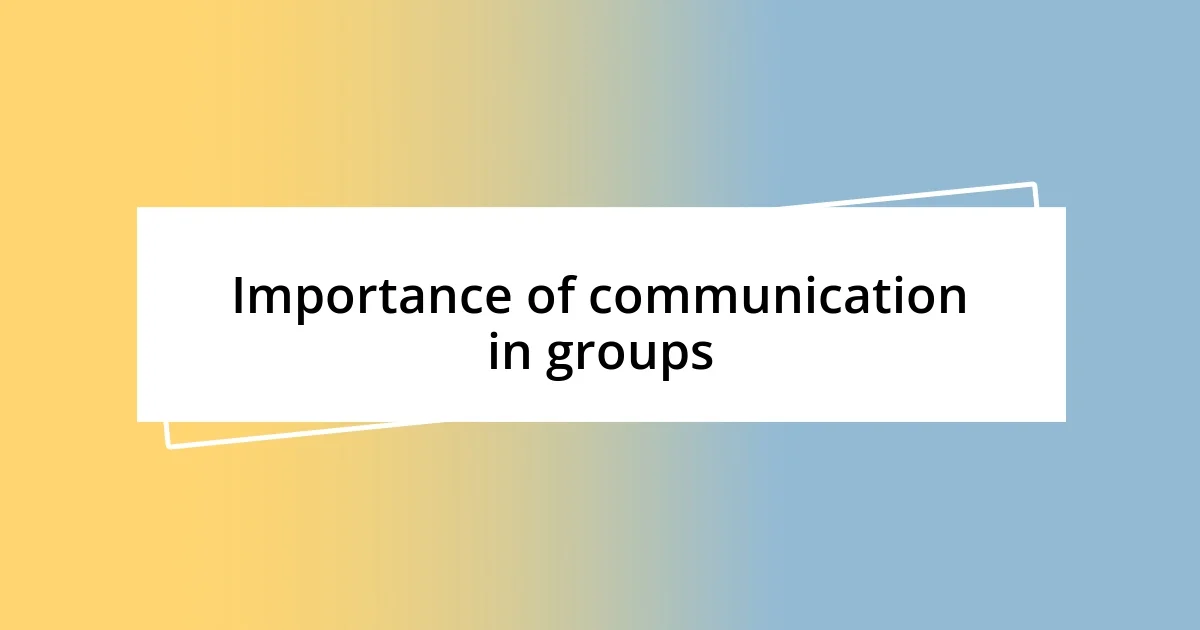
Importance of communication in groups
Effective communication is the backbone of any successful group travel experience. I vividly recall a trip where I assumed everyone was on the same page about our itinerary, only to discover later that several members had different expectations. This miscommunication led to frustration and a sense of disconnection among us. It wasn’t until we gathered one evening to openly share our thoughts and wishes that we could realign our plans. That night taught me just how crucial it is to express ourselves clearly and listen actively.
Here are key points highlighting the importance of communication in groups:
- Clarification of Expectations: Sharing individual desires prevents misunderstandings.
- Building Trust: Honest discussions foster a supportive environment.
- Conflict Resolution: Addressing issues early can avoid escalating tensions.
- Enhancing Collaboration: Open dialogue encourages brainstorming and collective problem-solving.
- Creating Memories: Sharing experiences and feelings strengthens group bonds.
In my experience, the moments when we spoke candidly were always the moments that knitted us closer together.

Roles within group travel settings
When it comes to group travel, each member often finds themselves naturally fitting into different roles based on their personality and preferences. For instance, I’ve often seen some people emerge as the planners, meticulously organizing every detail, while others relax into a more flexible role, easily adapting to changes. It’s quite interesting how these roles manifest; on one trip, a friend of mine became the unofficial photographer. He dedicated himself to capturing every moment, and his enthusiasm not only documented our adventures but also provided a fun lens through which we all appreciated the experience.
In my travels, I’ve noticed that the role of the peacekeeper is equally vital. There’s always someone who seems to intuitively sense the shifting dynamics and steps in to smooth over conflicts. During a hiking trip, when tensions rose over a disputed route, one member calmly suggested we take a break and share our thoughts. This simple act of allowing space for dialogue turned a potential fallout into a productive discussion, reinforcing the bonds within the group.
The roles in group travel extend beyond organizers and peacemakers; they can also include motivators and supporters. I remember a colleague who was renowned for her uplifting spirit, often encouraging the group during challenging moments, like when we faced a particularly grueling climb. Her positivity transformed the atmosphere, reminding us that every struggle was simply a part of the adventure. Such roles enhance the overall experience by creating a sense of belonging and collaboration, which is ultimately what makes group travel special.
| Role | Description |
|---|---|
| Planner | Organizes details and creates itineraries. |
| Peacekeeper | Mediates conflicts and maintains harmony. |
| Motivator | Inspires and uplifts the group during challenges. |
| Supporter | Provides emotional backing and encouragement. |
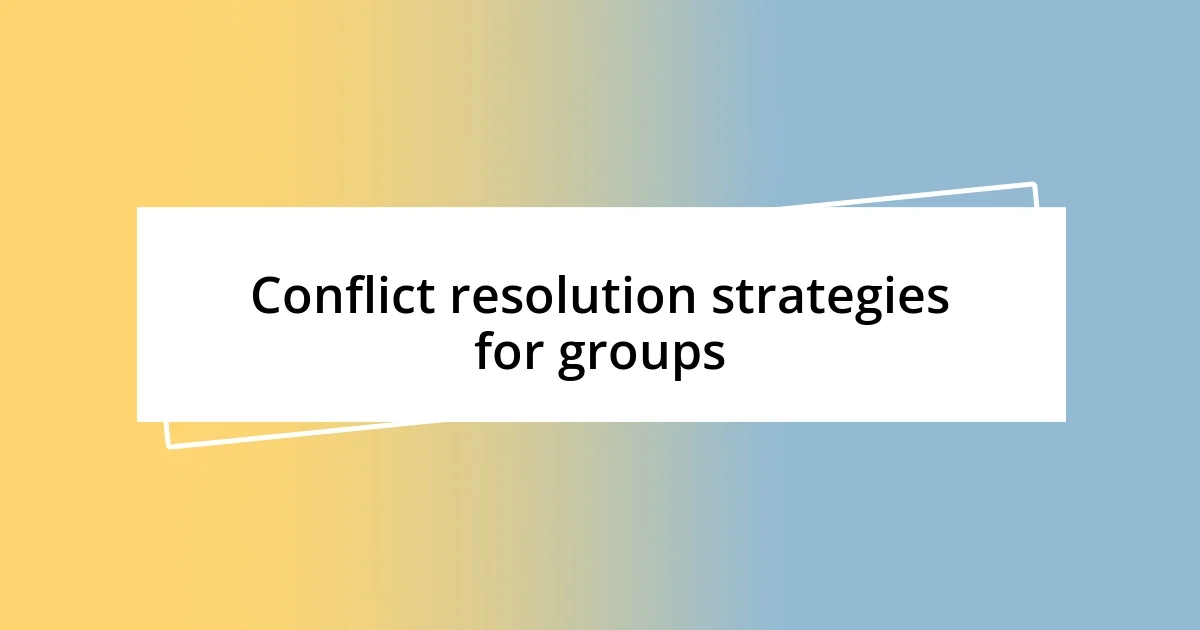
Conflict resolution strategies for groups
In my experience, proactively addressing conflicts can prevent them from ballooning into major issues. I recall a time when two friends clashed over differing preferences in accommodation. Instead of allowing the tension to simmer, we held a brief meeting where everyone could voice their opinions. That simple discussion led to a compromise that surprised us all and reinforced how collaboratively solving problems can transform friction into teamwork.
Another effective strategy is to establish ground rules for how conflicts should be handled. On one trip, we agreed that whenever disagreements arose, we would take a moment to step away and cool down before discussing the issue. This approach not only reduced the emotional heat of the moment but also allowed us to articulate our feelings more clearly later. How often do we react too quickly, only to regret it later? Setting these guidelines ahead of time offered us clarity and control in those crucial moments.
Lastly, embracing humor can be a powerful tool for conflict resolution. There was a hilarious incident during a road trip when we got lost, and rather than allowing frustration to brew, we turned the situation into a joke, dubbing ourselves the “adventure seekers.” This lightheartedness diffused the tension and reminded us that, at the end of the day, our shared experiences and laughter were far more valuable than any petty disagreement. Isn’t it amazing how a little levity can bridge divides and bring a group closer?
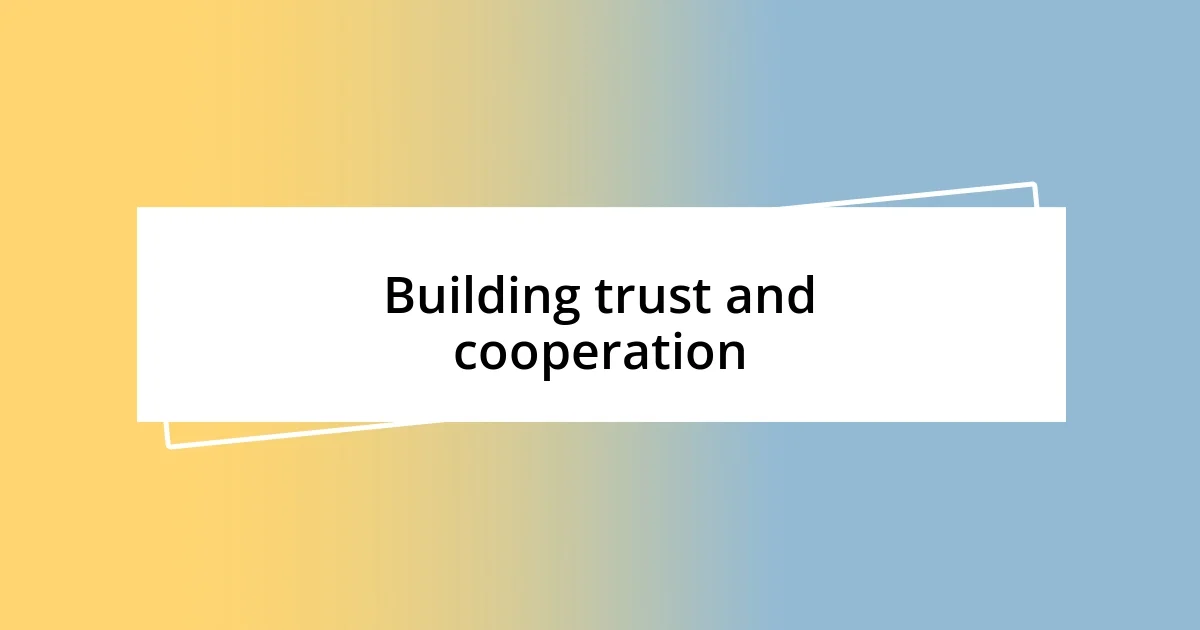
Building trust and cooperation
Building trust and cooperation in a group setting is essential for a seamless travel experience. I can still vividly recall a trip to Italy where we kicked off our adventure with a simple icebreaker game. Sharing fun facts about ourselves not only broke the initial awkwardness but also helped us discover common interests. From that moment on, it felt like we were more than just a group of travelers; we became a mini family, eager to support one another.
One of my favorite moments that exemplified this trust was when we faced an unexpected delay due to bad weather. While some felt frustrated, others immediately stepped up. We gathered around and began brainstorming alternative plans together, each sharing ideas ranging from a cooking class to an impromptu museum visit. This collaborative spirit not only gave us a sense of direction but fostered a stronger bond among us, proving that trust isn’t just about comfort; it’s about collective problem-solving.
I’ve learned that acknowledging each member’s contributions further reinforces cooperation. On a trip to Thailand, I noticed how simply thanking someone for their input during discussions encouraged more enthusiastic participation from everyone. It made me realize: when we validate each other’s opinions, we cultivate a space where everyone feels valued and empowered. Isn’t that what we all want on our adventures together?

Practical tips for successful group travel
One of the most practical tips I can offer for successful group travel is to set clear expectations from the start. On one trip to South America, we took some time before embarking on our adventure to discuss our individual priorities—things like sightseeing, relaxation, and budget. By laying everything out on the table, we created a roadmap that helped everyone feel heard and aligned. Have you ever gone on a trip only to realize halfway through that some members wanted completely different experiences? I certainly have, and it can lead to unnecessary frustration.
Another tip is to assign roles within the group. I remember traveling with a diverse group in Europe, and we decided it would be beneficial for each person to take on a specific responsibility during our stay. One person became the navigator, another handled accommodations, while someone else took charge of meals. This division of labor not only made planning smoother but gave everyone a sense of ownership over the trip. Isn’t it empowering to know that you play a crucial part in creating those unforgettable memories?
Lastly, don’t underestimate the power of flexibility. On a trip to Japan, we had an itinerary that quickly went off course when we stumbled upon a local festival. Instead of adhering strictly to our plans, we embraced the unexpected and immersed ourselves in the vibrant atmosphere. Moments like these can often lead to the most cherished memories. Have you ever had a spontaneous adventure that turned out to be the highlight of your trip? Embracing the unpredictable can turn a good trip into an amazing one!
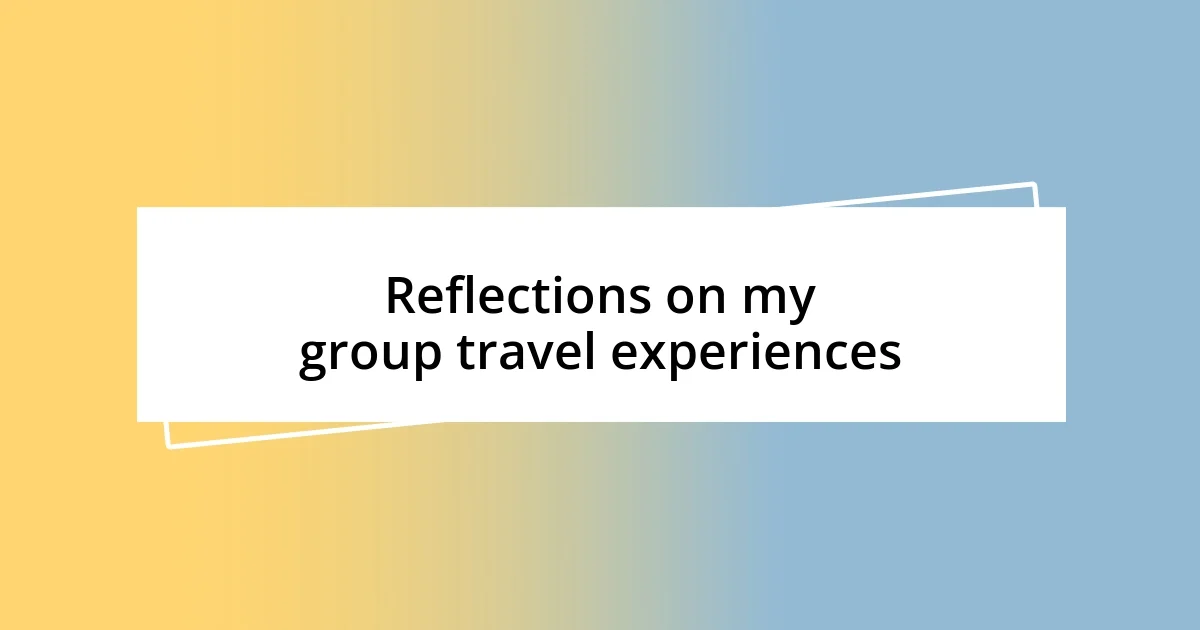
Reflections on my group travel experiences
Reflecting on my group travel experiences, I truly value the moments that tested our dynamics. I remember a hiking trip in the Rockies where a sudden rainstorm hit us. Instead of panicking, we huddled together, sharing stories and snacks while waiting for the weather to clear. That forced pause deepened our connections, reminding me how shared challenges can knit a group tighter.
On another occasion, during a tour in Greece, I was struck by how the simple act of sharing meals transformed our experience. As we passed dishes around the table, I noticed conversations flowed more easily; laughter and stories filled the air. Sharing that food felt intimate, almost sacred, making us more than just companions. It highlighted how these small acts could create cherished memories—have you ever felt that bond with strangers over a meal?
One of my most profound realizations came during a road trip through Australia. As we took turns behind the wheel, I saw how perspectives shifted. Each person brought their unique flavor to our journey, which ignited enriching discussions. I found it fascinating how often our conversations veered into life’s bigger questions. Isn’t it amazing how traveling together can lead to deeply personal revelations? These reflections continually remind me that group travel is not just about the sights; it’s about the people—and the growth we experience together.





